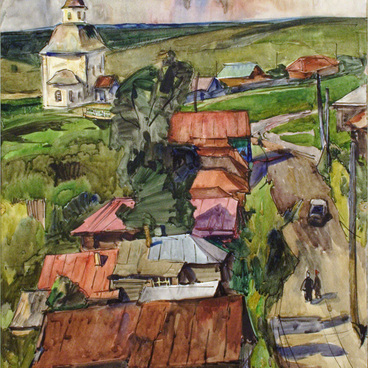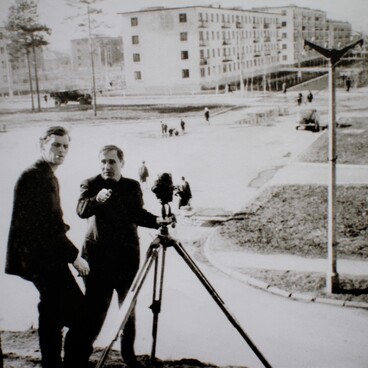Shukshin received a certificate of general secondary (complete) education in 1953, aged 24. In 1943, he finished the 7th form and entered the Biysk Automobile Technical School. He never finished his studies there, however, and joined a collective farm instead.
All this time Shukshin dreamed of getting a certificate of secondary education. This idea finally matured during his service in the navy. In a letter dated 27 March 1951, he asked his sister Natasha to send him the most complete textbook of Russian, preferably for the Pedagogical Institute. The future writer and director also asked his mother to take a certificate from the technical school and to tell them that he had not finished his studies because he had no money and that he was doing military service at the moment.
In 1952, Shukshin was dismissed from military service with a diagnosis of gastric and duodenal ulcer. He returned to the village of Srostki and asked the local school principal, Nikolai Zhabin, to allow him to take graduation exams as an external student. Zhabin agreed, and Shukshin began to prepare hard: he attended afternoon and evening classes and studied physics, maths and chemistry. The maths teacher Zinaida Kovyazina noted his extraordinary commitment and willpower. She recalled that Shukshin tried to spend every minute of his time on learning. He was never shy about younger classmates and always asked teachers to explain complex material.
The school gave permission to start the exams on 15 May, and Shukshin began to take them as early as June. He was able to pass all the exams, except for the foreign language, so he retook it in August. As a result, Shukshin got three “fives” (excellent) — in Geography, History of the USSR, and Constitution of the USSR — six “fours” (good) and five “threes” (satisfactory). Shukshin said that he never had to work so hard, so he perceived his passing the exams as a small feat.
After obtaining the certificate, Shukshin worked for a year in an evening school as a teacher of Russian, History and Literature, and also a headmaster. While working as a teacher, he published two articles in the Battle Cry newspaper, noting the merits of the local evening school that enabled many people from Srostki to continue their education in colleges or universities.
All this time Shukshin dreamed of getting a certificate of secondary education. This idea finally matured during his service in the navy. In a letter dated 27 March 1951, he asked his sister Natasha to send him the most complete textbook of Russian, preferably for the Pedagogical Institute. The future writer and director also asked his mother to take a certificate from the technical school and to tell them that he had not finished his studies because he had no money and that he was doing military service at the moment.
In 1952, Shukshin was dismissed from military service with a diagnosis of gastric and duodenal ulcer. He returned to the village of Srostki and asked the local school principal, Nikolai Zhabin, to allow him to take graduation exams as an external student. Zhabin agreed, and Shukshin began to prepare hard: he attended afternoon and evening classes and studied physics, maths and chemistry. The maths teacher Zinaida Kovyazina noted his extraordinary commitment and willpower. She recalled that Shukshin tried to spend every minute of his time on learning. He was never shy about younger classmates and always asked teachers to explain complex material.
The school gave permission to start the exams on 15 May, and Shukshin began to take them as early as June. He was able to pass all the exams, except for the foreign language, so he retook it in August. As a result, Shukshin got three “fives” (excellent) — in Geography, History of the USSR, and Constitution of the USSR — six “fours” (good) and five “threes” (satisfactory). Shukshin said that he never had to work so hard, so he perceived his passing the exams as a small feat.
After obtaining the certificate, Shukshin worked for a year in an evening school as a teacher of Russian, History and Literature, and also a headmaster. While working as a teacher, he published two articles in the Battle Cry newspaper, noting the merits of the local evening school that enabled many people from Srostki to continue their education in colleges or universities.

